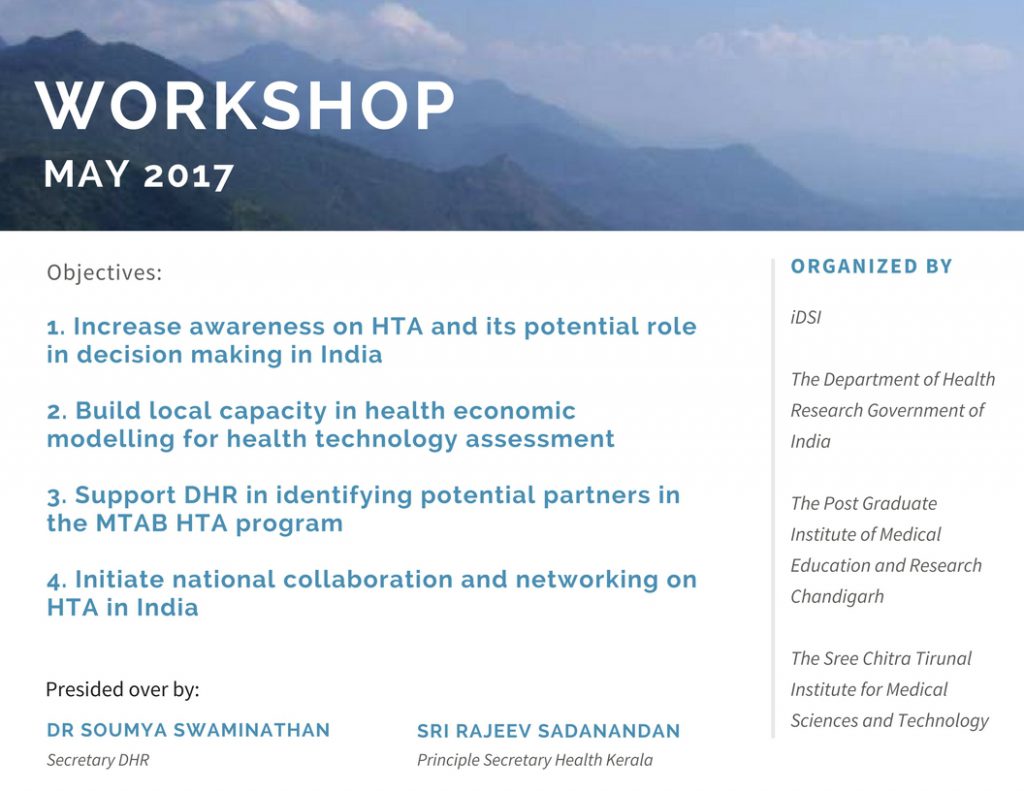Health Technology Assessment (HTA) is an important tool for prioritizing health resources in India’s journey towards Universal Health Coverage (UHC).
This was one of the key take-home messages from the first in a series of workshops designed to build capacity for undertaking HTA analyses in India.
Participants from technical institutions across the country travelled to Thiruvananthapuram in Kerala to join this workshop. The workshop focused on supporting India in the transition towards a formalized system of using evidence to inform health resource allocation. The Department of Health Research, Government of India are leading on this by establishing a medical technology assessment board (MTAB). Building capacity to undertake health economic analyses in India will be an imperative foundation for the success of the HTA program under MTAB.
Key take-home messages from the workshop:
HTA is an important tool for prioritizing health resources in India’s journey towards UHC: Dr Soumya Swaminathan, Secretary DHR and Director General of the Indian Council of Medical Research (ICMR) discussed the importance of HTA for India. Ensuring that an evidence-based, inclusive, and transparent system is put in place via the MTAB will aid health resource allocation decisions. As a result, healthcare decisions will be made on the basis of best value for money for the Indian people.
Sri Rajeev Sadanandan, Principle Secretary for the State of Kerala, further reiterated this sentiment and expressed his commitment to establishing a center for HTA in Kerala.
Dr Laura Downey lead a discussion on what UHC means for India, and how establishing a fully functioning MTAB centers on utilizing the best available evidence. This will provide a sound basis upon which health resource allocation decisions can be made in India, to ensure that every rupee spent buys the maximum health possible.
Economic analysis requires a lot of evidence, some of which isn’t always easily available: Discussions relating to evidence were a common theme throughout the workshop. Dr Miqdad Asaria outlined the kinds of evidence that is required to undertake a HTA analyses. Dr Akashdeep Chauhan presented on how evidence for health costs is being collected from across India to form a common costing database. Dr Laura Downey also introduced the concept of utility tariffs for measuring quality of life to estimate Quality Adjusted Life Years (QALYs) or Disability Adjusted Life years. Together these presentations stimulated lengthy discussions amongst participants as to the difficulties of conducing HTA in India, when such evidence is often not available and not routinely collected.
Dr Yot Teerawattanon shared his experience from Thailand, where HITAP conducted primary research to fill these gaps to inform Thai analyses. This included collecting an EQ5D dataset to build a Thai value set for quality of life utility tariffs. Dr Kavitha Rajshekar from DHR highlighted that in order to address some of these data gaps in India, the MTAB will collaborate with the National Institute of Medical Statistics (NIMS) to build a National data repository to inform HTA analyses.
A mechanism for identifying and addressing data gaps will also be put into place through capitalizing on the partnership between the DHR (government policy-making body) and the ICMR (a scientific primary medical research body).
A reference case for economic evaluation is essential to guide structured, transparent, and technically sound analysis: The necessity for a reference case for Indian health technology assessment was highlighted throughout the workshop.
Dr Deepshikha Sharma lead a discussion regarding the different dimensions a reference case must cover, such as whether DALY or QALY should be used, and at what level a threshold for cost effectiveness must be set.
Dr Miqdad Asaria lead further discussion regarding the importance of setting a threshold at the right level for India to limit the opportunity cost of where resources could potentially be better spent.
Dr Laura Downey and Dr Kavitha Rajshekar shared plans for the development of the Indian reference case under MTAB. They explained that a reference case for economic evaluation will be collaboratively developed, and that all technical institutions whom undertake HTA as part of the MTAB program of work will be required to follow this guide.
Want to know more about HTA?
Health Technology Assessment in Universal Health Coverage
WHO resolution on Health Technology Assessment
National Institute of Health: “HTA 101”
Organizer’s information:
The Department of Health Research Government of India
The Post Graduate Institute of Medical Education and Research Chandigarh
The Sree Chitra Tirunal Institute for Medical Sciences and Technology
Useful links:
iDSI reference case for economic evaluation
Informing global health decision making: Cost per DALY thresholds and health opportunity costs
Country-level cost effectiveness thresholds : Initial estimates and need for further research
